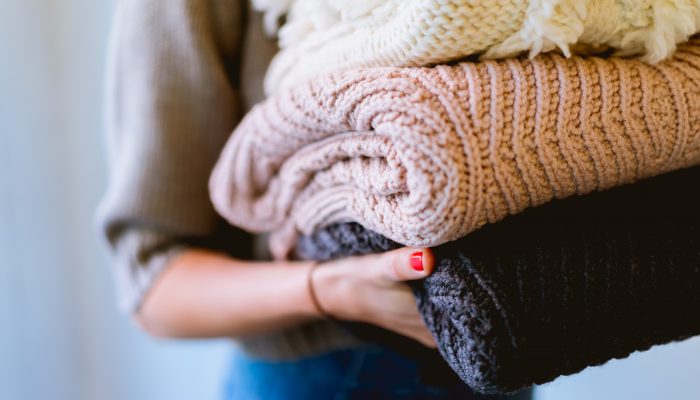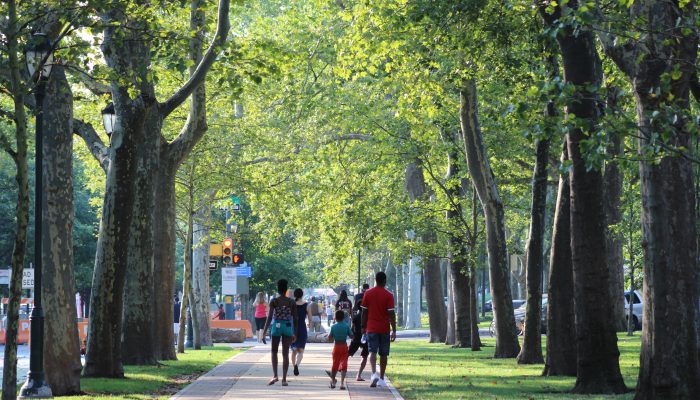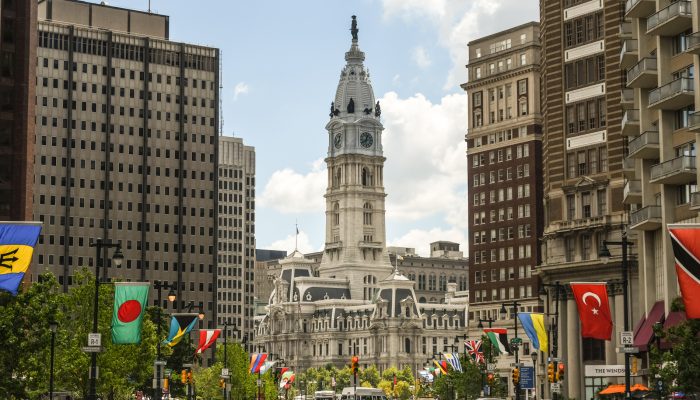Philadelphia residents throw more than 35,000 tons of clothing and other textiles in the trash each year, and about 85% of all textiles Americans buy end up in landfills. When textiles are thrown away as trash, they increase the amount of waste sanitation workers must collect, contribute to the negative environmental and health impacts of landfilling and incineration, and cost the City money.
Producing clothing can also be very resource intensive. Manufacturing an average cotton t-shirt consumes 2,700 liters of water, and making a pair of jeans produces as much greenhouse gases as driving a car more than 80 miles. About 20 pieces of clothing are produced per person per year, and so the resources needed to create textiles along with the negative impacts of throwing them in the trash really add up.
Taking steps to keep clothing and other textiles out of landfills can reduce the negative impacts of what we wear and promote sustainable systems for managing materials locally. Be sure to keep clothing and other textiles out of your curbside recycling bin, as they are not accepted in the City’s curbside recycling program and can get caught in recycling machinery.
Here are a few tips for keeping used clothing and textiles out of the trash:
Reuse, donate, gift, or sell used clothing and other textiles.
- Use the City’s Recycling & Donation Finder* to learn where to recycle or donate textiles and many other items locally and keep them out of the landfill. You can search by address or by material to find a list of locations nearest to you. Start your search with the Recycling & Donation Finder.
- Host a clothing swap to exchange unwanted clothing with friends and neighbors, or give unwanted clothing and other textiles new life by gifting them to a neighbor through a neighborhood Buy Nothing Facebook group. (Note: Be sure to follow the City’s recommended COVID-19 safety guidelines and to check with your Buy Nothing group’s administrators for required safety precautions.)
- The Philadelphia Fabric Exchange Facebook group is working to promote sustainable fashion and prevent textile waste from entering landfills. Use this page as a resource to get rid of fabric you don’t need or find new fabric you do need.
- With textiles too worn or tattered to donate, create rags for cleaning and other household uses, or for crafting and art projects.
- Donate towels, blankets, and other used fabric to ACCT Philly or another local animal shelter for bedding and cleaning rags.
Recycle any textiles that aren’t suitable for donation or reuse.
- For items that are too worn or not appropriate for donation, use Retreivr** for free curbside pickup for recycling of clothing, accessories, and shoes. Retrievr also collects used electronics. Schedule a pickup with Retrievr.
Buy second-hand where possible.
- Before buying clothing and other textiles new, check resale options such as thrift stores, vintage stores, and other second hand retail outlets. Shopping second hand and vintage also allows shoppers to find one-of-a-kind pieces while supporting the local economy.
- You can also buy and sell lightly used clothing, shoes, and accessories through digital resale services.
Shop local and invest in quality, durable items.
- Consider renting clothing with online clothing rental services before buying new.
- Purchase only what you need, and when buying new, invest in quality items that last longer—and to further support your community, try purchasing from small, local neighborhood shops.
- Do your research — choose to purchase clothing from sustainable companies that offer items made from recycled or re-purposed materials.
- Care for your clothing properly and follow washing instructions so that your items last as long as possible.
* To learn about adding your organization or company to the City’s Recycling & Donation Finder, contact cleanphl@phila.gov.
**The City of Philadelphia has a contract with Retrievr. Learn more about Retrievr and the City’s partnership with the company here.
Disclaimer: Reference in this blog to any specific commercial product, process, or service, or the use of any trade, firm or corporation name is for the information and convenience of website visitors, and does not constitute endorsement, recommendation, or favoring by the City of Philadelphia.




